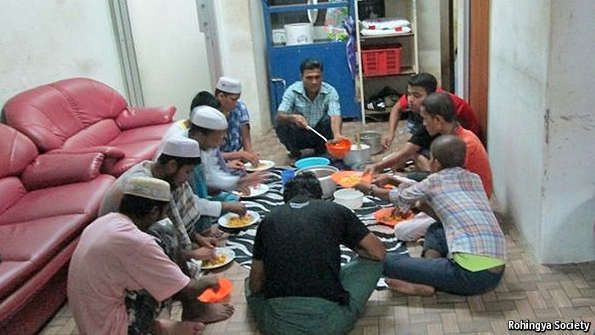
Malaysia's Rohingyas get little help from the government
A REFUGEE couple and their two small children sit patiently on a cement staircase in Ampang, an eastern district of Kuala Lumpur, Malaysia’s capital. They are waiting at a drop-in centre run by the Rohingya Society in Malaysia, an organisation which aids asylum seekers escaping religious persecution in Rakhine, Myanmar’s westernmost state. Since 2012—when attacks by their Buddhists neighbours prompted a surge in the number of Muslim Rohingyas fleeing to Malaysia on rickety boats—the society has provided physiotherapy and basic medicines to the most vulnerable new arrivals. “Some have been beaten up by traffickers,” says Abdul Hamid, its president. “Some are suffering from vitamin deficiencies, and cannot stand properly. It is like they are paralysed.”
Malaysia was the intended destination of more than 3,000 boat people who scrambled onto beaches around South-East Asia in May, abandoned by their traffickers after a government crackdown blocked commonly used routes across Thailand. Many were Rohingyas, attracted not just by Malaysia’s wealth but also its Islamic heritage. Yet life is tough for the 100,000 or so Rohingyas thought to have arrived there since the 1970s. Malaysia has not signed the UN’s convention on refugees, and makes no distinction between asylum-seekers and migrants who sneak in to find work. Rohingyas may not legally hold a job and have no right to health care or schooling. They are far more likely than locals to suffer beatings, rape or murder. They are commonly hassled by police, who see them as an easy source of bribes.
A refugee card, supplied by the UN’s refugee agency (UNHCR), provides some protection from deportation. Obtaining one is an early priority for Rohingyas, many of whom have never owned any kind of ID. Yet the agency has struggled to cope with the growing influx, particularly as its modest resources are sapped by migrant emergencies in north Africa. Asylum seekers can wait two to three years to have their refugee status confirmed. Service is swifter for those languishing in Malaysian detention centres, for whom refugee status often enables release. But the average time they must wait behind bars has also been growing, and in some cases is longer than a year.
Campaigners say the Malaysian authorities have been discouraging the UN from handing out many more cards, for fear that it is prompting fresh arrivals. The government’s tolerance of undocumented migrants—and of the trafficking networks who supply them—waxes and wanes. Officials know that refugees are a useful source of cheap labour, given that Malaysians increasingly disdain dirty or dangerous jobs. Efforts to secure Malaysia’s northern border are stymied not just by its length and terrain but also by corruption.
In principle people who register with UNHCR are put in line for resettlement. Each year around 14,000 refugees from Myanmar are resettled from Thailand and Malaysia. Most go to America; though Australia, New Zealand and Scandinavian countries also accept some. But the wait can be more than a decade. Rohingyas complain that Myanmar refugees from other ethnic groups, such as the Chin, appear to be registered and resettled more quickly (they suspect that receiving countries would prefer not to take Muslims). Many would like to stay in Malaysia, if their lot could be improved. Some of the earliest arrivals now have children and grandchildren, all living without papers.
With little assistance available from the government, Malaysia’s Rohingyas have to help themselves. In his office on the outskirts of Kuala Lumpur, Zafar Ahmad, a campaigner for Rohingyas’ rights, points proudly at a mountain of donated clothes, nappies and bottled water destined for the detention centres. As well as providing some medical care, Dr Hamid’s organisation, which rents space nearby, gives refugees who have not yet obtained refugee cards official-looking letters designed to reduce friction with police and other authorities.
Dr Hamid left Rakhine after a bout of violence in the mid-1990s, during which an acquaintance died from beatings suffered in military custody. At the time Rohingyas could travel a little more freely; he moved to Malaysia in 1997, where he studied chemistry. But Myanmar refused to renew his passport, and Malaysia will not formalise his residency. That leaves his family stateless. In the coming months they will finally be resettled; they are pleased to be moving to Texas, where the weather is not too cold. Dr Hamid’s qualifications will probably not be recognised and the thought of a new start is intimidating—but it is a relief, nonetheless.
Media are growing more interested in the refugees’ plight, especially since the dramatic landings in May. “Everyone wants a photo of a Rohingya now,” mutters one campaigner. “It’s like they’re Spider-Man or something,” he says. But if anything life for asylum seekers in Malaysia is getting more difficult. A government concession that had allowed refugees a discount on some health services is due to expire this month. A slowing economy may prompt the authorities to clamp down on them.
They will probably keep coming, regardless. Dr Hamid says some newly-arrived Rohingyas are “depressed” by the limited freedoms in Malaysia, after the trauma of their flight. But in time almost all of them agree that life there is better than the scarcity, oppression and violence they have faced at the hands of neighbouring communities in Rakhine state. “We are nothing in Myanmar,” he says. “We have lost everything—our dignity, our rights. Wherever we go people think we are parasites.”
No hay comentarios.:
Publicar un comentario